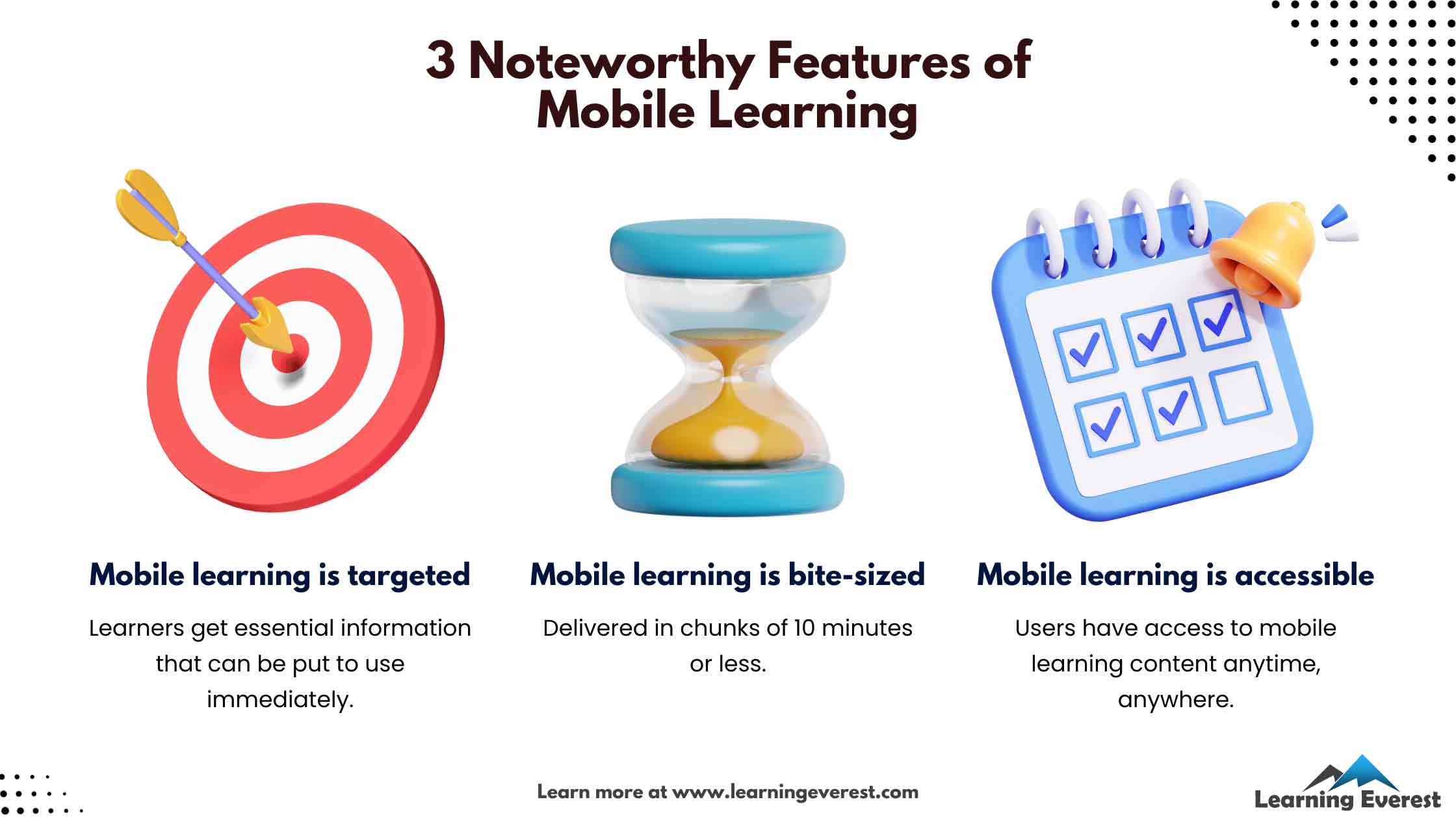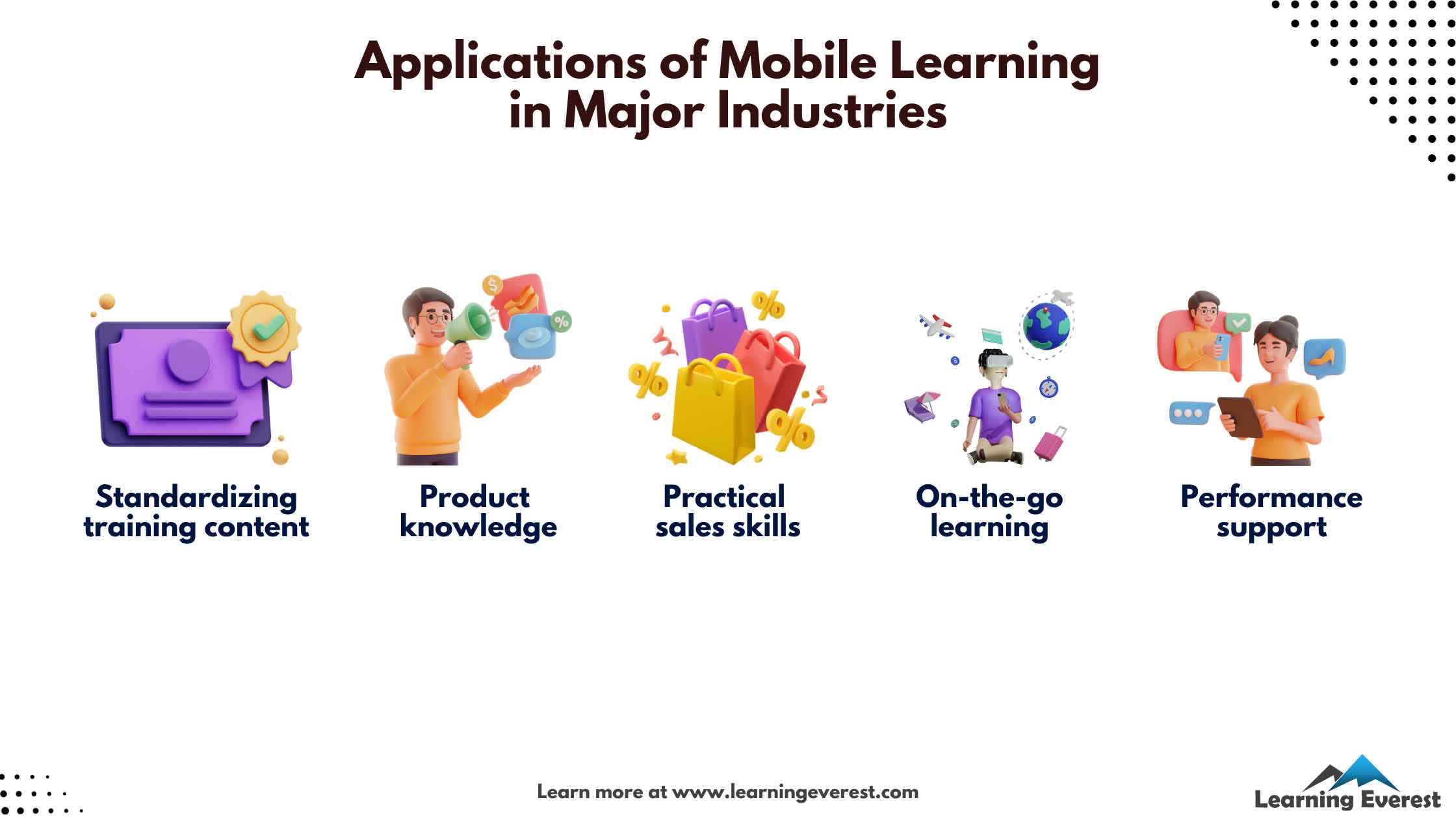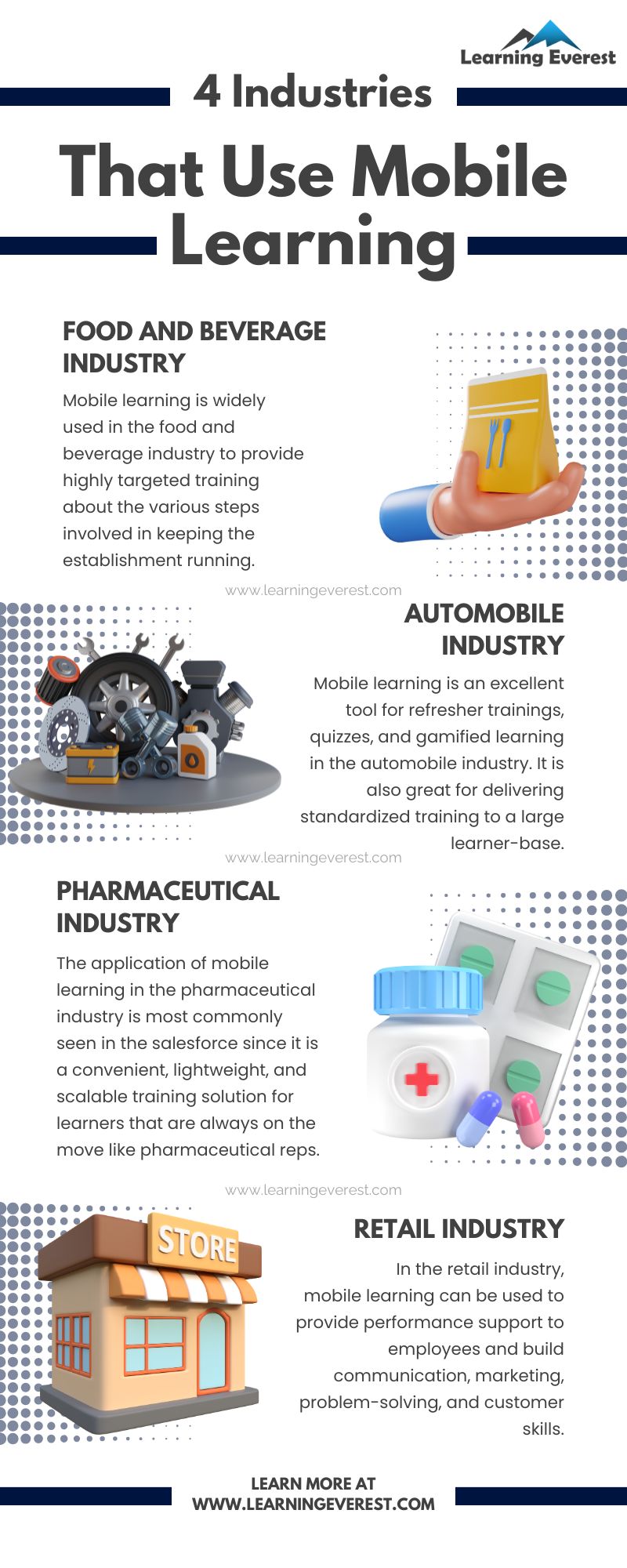The adoption and application of mobile learning has been slow and steady across industries. Mobile learning as a training solution has gradually taken shape over a decade and a half. But with research and innovation, along with the rise of remote work and the gig economy, mobile learning has now become incredibly popular. Today, mobile learning has evolved to bring quick, actionable knowledge and skills to learners’ fingertips, making it a favorite among users. This article will look at the application of mobile learning in 4 major industries to see how each of them leverages the medium.
Features of Mobile Learning
Mobile learning (or mLearning) is learning that is meant for and delivered on a mobile device. Mobile learning is portable and accessible.
Before we dig into industry-specific mobile learning, it is worth mentioning some of the key features of mobile learning.
- Mobile learning is bite-sized: Mobile learning courses are delivered as microlearning. Each module focuses on a single learning objective and does not exceed 10 minutes in duration.
- Mobile learning is highly targeted: Due to their short duration, mobile learning courses contain highly targeted information. Learners only get that information which is essential for understanding and/or applying a concept.
- Mobile learning can be accessed anytime and anywhere: Due to the handiness of mobile phones, users can conveniently carry them around. As a result, learners have ready access to mobile learning content as long as their device meets the prerequisites for running a course (For example, a stable internet connection).

3 Noteworthy Features of Mobile Learning
Application of Mobile Learning in the Food and Beverage Industry
The food and beverage industry is one of the most prominent users of mobile learning. Mobile learning has seen a great increase in usage in the fast-food industry, especially.
Given the fast-paced nature of the food and beverage industry, employees constantly need to be on their toes, think quickly, and execute their tasks without errors to ensure customer satisfaction. Employees also need to remember recipes and how to assemble different orders, as well as keep track of restaurant shorthand for accurate communication.
The application of mobile learning in the food and beverage industry centers around these requirements. It is common for restaurants and fast-food chains to provide highly targeted training to learners about the various steps involved in keeping the establishment running.
Some common training topics include:
- How to take orders
- How to manage inventories
- How to prep for dishes and beverages
- How to make/assemble menu items
- How to wash/clean ingredients
- How to handle laundry
- Hygiene standards to follow
Since these processes aren’t very complex or technical but still require to be carried out in the correct order, mobile learning’s quick and actionable training is a perfect fit.
Mobile learning gives employees in this industry a just-in-time training repertoire they can quickly access and learn from as soon as a need arises. This allows employees to become productive quickly, benefitting the business’ efficiency and service.
The training can be delivered as step-by-step graphics, interactive courses, videos, PDFs and documents, and more, depending on factors like budget, training content, etc.
Application of Mobile Learning in the Automobile Industry
There are various applications of mobile learning in the automobile industry. Automobiles are intricate products that go through extremely thorough development and testing cycles. Additionally, best practices and processes in the automobile industry change constantly, depending on guidelines, benchmarks, and technological innovations.
Hence, the application of mobile learning in the automobile industry is mainly in the form of refresher trainings, quizzes, gamified learning, and short content such as infographics. These modules usually cover product training, process training, safety and compliance training, and soft skills training.
Mobile learning is especially useful in the automobile industry because there is a high level of standardization in processes, and often, firms are spread out geographically. Thus, mobile learning opens up an avenue to conveniently deliver uniform training content to users regardless of where they are.
However, it is worth mentioning that mobile learning cannot replace full-fledged training programs in the automobile industry. Instead, it is a valuable supplement to keep learners updated with short bursts of learning.
Application of Mobile Learning in the Pharmaceutical Industry
The application of mobile learning in the pharmaceutical industry is most commonly seen in the salesforce. Pharmaceutical products mainly include drugs and equipment that have very specific compositions, mechanisms, and uses. The pharmaceutical salesforce needs to have an accurate understanding of these details so they can relay the correct information to potential clients.
Additionally, as with any sales position, pharmaceutical salespeople need strong soft skills to establish and maintain long-lasting partnerships with their primary consumers.
Mobile learning is a popular training method in most sales-based jobs. In the pharmaceutical industry, it is used to impart precise and concise product knowledge and practical skills to the salesforce.
Furthermore, since pharmaceutical salespeople typically stay on the move, mobile learning is a convenient, lightweight, and scalable training solution for them.
Here are a few examples of the forms mobile learning might take in pharmaceutical sales training:
- Custom interactive courses with click, swipe, and drag functionalities
- Interactive scenarios to build product knowledge and soft skills
- Interactive and static graphics for quick perusal
- Podcasts and audio files
- Video-based mobile learning
Application of Mobile Learning in the Retail Industry
Much like the pharmaceutical industry, the application of mobile learning in the retail industry is mainly for salesforce training.
It is useful for updating and refreshing employees’ product and industry knowledge. It is also used to build employees’ communication, marketing, problem-solving, and customer skills. In other words, mobile learning and its accessibility are utilized in the retail industry to provide salespersons with reliable and quick performance support.
In customer-facing roles, employees need to schedule breaks and downtime carefully, depending on customer flow. In such a working environment, a full-fledged eLearning course or ILT can cut into an outlet’s business hours, which is not ideal. Due to this, mobile learning is being adopted more and more in the retail industry, as it provides learners with necessary information faster and just as efficiently as other training formats.
The delivery of mobile learning for sales training is similar to the other industries mentioned above.
Custom-made courses, gamified learning, scenario-based training, as well as the use of multimedia are all common ways to deliver mobile learning, due to the versatility of modern phones.

Applications of Mobile Learning in Major Industries
Conclusion
The industries mentioned above are only a few examples of the application of mobile learning. As industries and mobile learning tools and infrastructure evolve, so will the sophistication and innovation of mobile learning solutions. For instance, AR/VR technology is seeing greater adoption in eLearning, including mobile learning, thereby expanding the possibilities of how mobile learning can be used in the future.
Infographic

Exploring the Application of Mobile Learning in Four Major Industries
Knowledge Check!
Frequently Asked Questions (FAQs)
Is mobile learning eLearning?
Mobile learning (or mLearning) is learning that is meant for and delivered on a mobile device. eLearning, on the other hand, is not device-specific but is optimized for PCs and tablets.
What are the features of mobile learning?
Some features of mobile learning are:
- It is bite-sized
- It is highly targeted
- It can be accessed anytime and anywhere
What are the advantages of mobile learning?
Mobile learning is a highly accessible, portable, and scalable learning solution that provides quick and actionable just-in-time learning.





